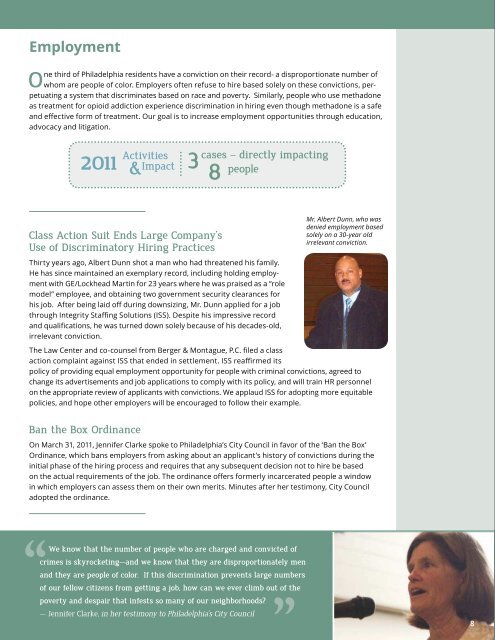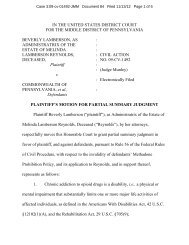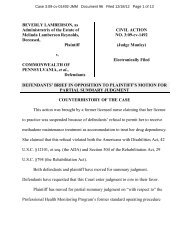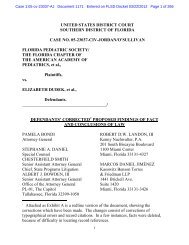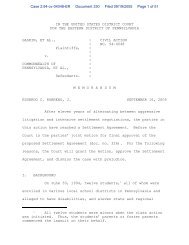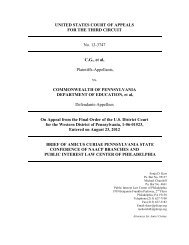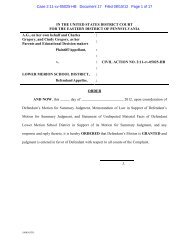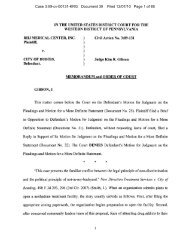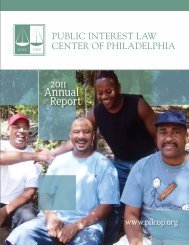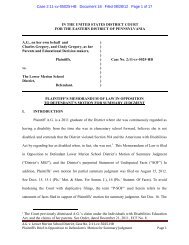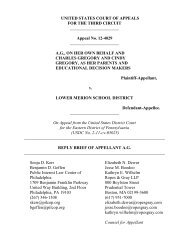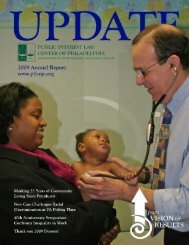2011 Annual Report - Public Interest Law Center of Philadelphia
2011 Annual Report - Public Interest Law Center of Philadelphia
2011 Annual Report - Public Interest Law Center of Philadelphia
You also want an ePaper? Increase the reach of your titles
YUMPU automatically turns print PDFs into web optimized ePapers that Google loves.
Employment<br />
One third <strong>of</strong> <strong>Philadelphia</strong> residents have a conviction on their record- a disproportionate number <strong>of</strong><br />
whom are people <strong>of</strong> color. Employers <strong>of</strong>ten refuse to hire based solely on these convictions, perpetuating<br />
a system that discriminates based on race and poverty. Similarly, people who use methadone<br />
as treatment for opioid addiction experience discrimination in hiring even though methadone is a safe<br />
and effective form <strong>of</strong> treatment. Our goal is to increase employment opportunities through education,<br />
advocacy and litigation.<br />
<strong>2011</strong> Activities<br />
&Impact cases – directly impacting<br />
3 people 8<br />
Class Action Suit Ends Large Company’s<br />
Use <strong>of</strong> Discriminatory Hiring Practices<br />
Thirty years ago, Albert Dunn shot a man who had threatened his family.<br />
He has since maintained an exemplary record, including holding employment<br />
with GE/Lockhead Martin for 23 years where he was praised as a “role<br />
model” employee, and obtaining two government security clearances for<br />
his job. After being laid <strong>of</strong>f during downsizing, Mr. Dunn applied for a job<br />
through Integrity Staffing Solutions (ISS). Despite his impressive record<br />
and qualifications, he was turned down solely because <strong>of</strong> his decades-old,<br />
irrelevant conviction.<br />
The <strong>Law</strong> <strong>Center</strong> and co-counsel from Berger & Montague, P.C. filed a class<br />
action complaint against ISS that ended in settlement. ISS reaffirmed its<br />
policy <strong>of</strong> providing equal employment opportunity for people with criminal convictions, agreed to<br />
change its advertisements and job applications to comply with its policy, and will train HR personnel<br />
on the appropriate review <strong>of</strong> applicants with convictions. We applaud ISS for adopting more equitable<br />
policies, and hope other employers will be encouraged to follow their example.<br />
Ban the Box Ordinance<br />
On March 31, <strong>2011</strong>, Jennifer Clarke spoke to <strong>Philadelphia</strong>’s City Council in favor <strong>of</strong> the ‘Ban the Box’<br />
Ordinance, which bans employers from asking about an applicant’s history <strong>of</strong> convictions during the<br />
initial phase <strong>of</strong> the hiring process and requires that any subsequent decision not to hire be based<br />
on the actual requirements <strong>of</strong> the job. The ordinance <strong>of</strong>fers formerly incarcerated people a window<br />
in which employers can assess them on their own merits. Minutes after her testimony, City Council<br />
adopted the ordinance.<br />
We know that the number <strong>of</strong> people who are charged and convicted <strong>of</strong><br />
crimes is skyrocketing—and we know that they are disproportionately men<br />
and they are people <strong>of</strong> color. If this discrimination prevents large numbers<br />
<strong>of</strong> our fellow citizens from getting a job, how can we ever climb out <strong>of</strong> the<br />
poverty and despair that infests so many <strong>of</strong> our neighborhoods?<br />
— Jennifer Clarke, in her testimony to <strong>Philadelphia</strong>’s City Council<br />
Mr. Albert Dunn, who was<br />
denied employment based<br />
solely on a 30-year old<br />
irrelevant conviction.<br />
Healthcare Access<br />
ederal law promises health and dental care to millions <strong>of</strong> low income children, a promise that, if only met, would improve<br />
F their life chances and avoid more serious complications <strong>of</strong> untreated conditions. Unfortunately, that federal promise—<br />
Medicaid—is too <strong>of</strong>ten not met as a result <strong>of</strong> state policies or payment practices. As a result, millions <strong>of</strong> children face long<br />
delays to care or cannot access care at all. Our goal is to secure for all children access to the care they need with lawsuits and<br />
advocacy to change the way in which states administer and pay for their Medicaid programs.<br />
The Gorenflo family, whose two sons —<br />
Thomas and Nathaniel — are named plaintiffs<br />
in the Florida Medicaid Case.<br />
<strong>2011</strong> Activities<br />
&Impact cases – impacting 3 people<br />
3,000,000<br />
<strong>Law</strong> <strong>Center</strong> briefs Supreme Court on obstacles to Medicaid Access<br />
The <strong>Law</strong> <strong>Center</strong> was honored to be called upon by the American Medical Association, American Dental Association, American<br />
Academy <strong>of</strong> Pediatricians and others to submit an amicus brief to the Supreme Court in the case <strong>of</strong> Douglas v. Independent<br />
Living <strong>Center</strong> <strong>of</strong> Southern California. The brief, written by James Eiseman and our partners at Bullock, Bullock & Blakemore,<br />
powerfully documents for the Court the devastating - and sometimes fatal - effects on Medicaid recipients when States set<br />
payment rates at insufficient levels. The brief encourages the Court to protect the right <strong>of</strong> private citizens to bring lawsuits<br />
against States that set rates too low, as it is the only method <strong>of</strong> keeping states accountable and ensuring access to care.<br />
Too <strong>of</strong>ten lost in technical legal discourse are the flesh-and-blood consequences cases such<br />
as this one have on real people. The consequences <strong>of</strong> inadequate access to healthcare have<br />
been dire for millions <strong>of</strong> people – largely children and people with disabilities – and the<br />
situation will get much worse if the Court refuses to enforce the law.<br />
— James Eiseman, Jr., <strong>Law</strong> <strong>Center</strong> Senior Attorney<br />
8 9 www.pilcop.org<br />
Florida Class Action Medicaid Case<br />
On February 2, 2012, after 94 days <strong>of</strong> trial over more than two years, both<br />
sides rested their cases in Florida Pediatric Society et al v. Dudek. The <strong>Law</strong><br />
<strong>Center</strong> and a team <strong>of</strong> pro bono attorneys from Boies, Schiller & Flexner<br />
brought the case on behalf <strong>of</strong> the 2,000,000 low-income children enrolled<br />
in or eligible for Medicaid in Florida who are not receiving medical or dental<br />
care they need. The decision is expected later this year, along with a decision<br />
on our motion for an injunction which points out that only one in five children<br />
enrolled in Medicaid in Florida today receives even minimal dental care. The<br />
motion asks the court to enjoin Florida <strong>of</strong>ficials from setting rates paid to<br />
providers solely on the basis <strong>of</strong> budgetary reasons and not based on what is<br />
needed to provide care.<br />
With the Supreme Court’s decision in Douglas v. Independent Living <strong>Center</strong><br />
(see below), now resolved without deciding the basic legal questions, this<br />
case is one <strong>of</strong> the high stakes legal battles that will establish whether or not<br />
states can be held accountable for actually delivering healthcare to children<br />
through their Medicaid programs.


